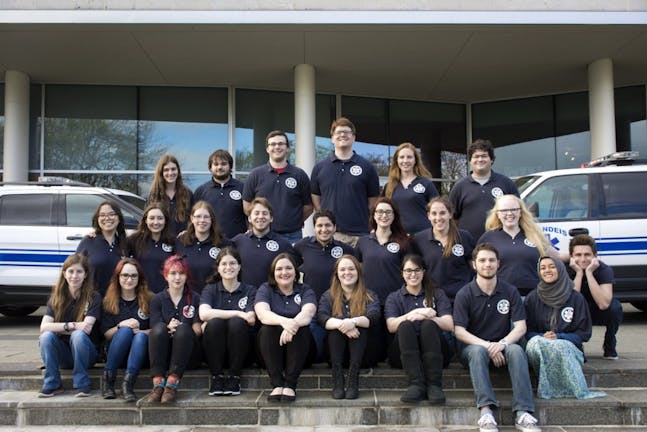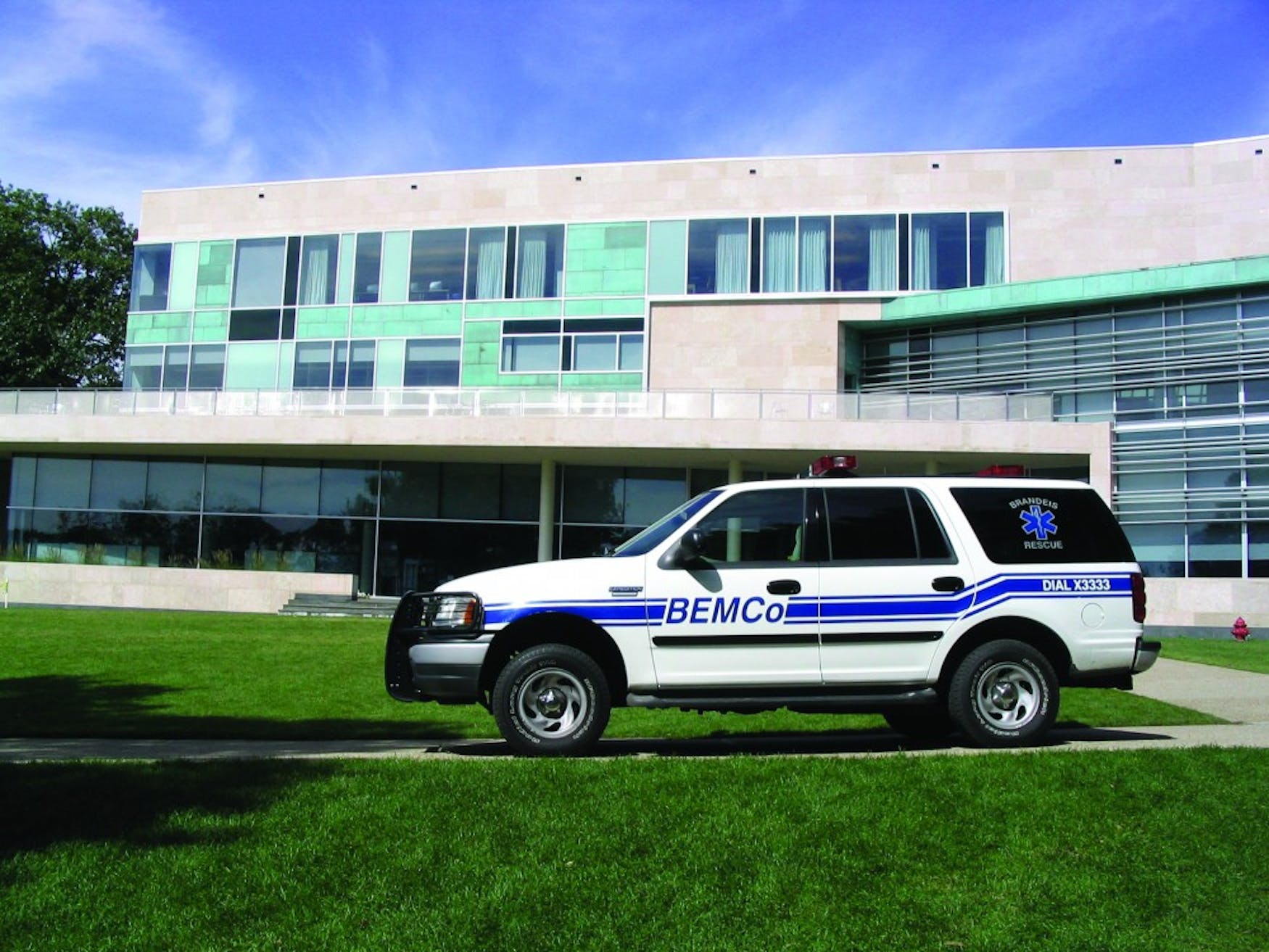Bringing Up BEMCo
Allison Lewis ’19 reveals the ups and downs of providing emergency services
They were stationed at the concert when the first call for help came. Someone was worried about a concertgoer who may have had too much to drink. Allison Lewis ’19 and the rest of her standby crew sprang into action.
As members of the standby crew that night, they may not have had their trucks, but they didn’t need them. Without rain to obscure their vision, it was easy to spot the intoxicated individual from their location. They shouldered their heavy first-aid bags, containing their most important tools for immediate care, from Band-Aids to bag valve masks (manual resuscitators), and walked over to help — Emergency Medical Technicians don’t run.
After ensuring their safety and that of bystanders, each crewmember got to work. While the primary EMT assessed the patient’s condition and determined what treatment was needed, the tertiary checked vital signs while the secondary recorded everything in the patient care report. As the supervisor, Lewis observed, checking to see that everyone was performing their jobs and helping wherever needed.
This is only a glimpse of the duty to act upheld by the Brandeis Emergency Medical Corps. Some people can hardly imagine having someone else’s life in their hands, but as Lewis shared in an interview with the Justice, it’s all in a day’s work for the members of BEMCo.
They are Brandeis’ student-run volunteer emergency medical service, providing around-the-clock care to all University students, faculty, staff and visitors on campus. Their services encompass the Foster Mods, Charles River Apartments, athletic fields, 60 Turner Street, anything on Loop Road and occasionally South Street or the Brandeis/Roberts Commuter Rail Station.
The BEMCo on-duty crew consists of four members, ranked by ascending leadership roles: tertiary, secondary, primary and supervisor. Generally, when someone calls about a medical incident, the Brandeis police dispatch the on-duty crew, transmitting the details of the call over radio. Lewis said that they usually get a vague description because its accuracy rests on the caller’s reporting abilities. “They kind of have to do a little bit of detective work to try to figure out what is going on so they can give us a little bit of information before we get there,” she said.
With such a wide variety of medical conditions, BEMCo members must always prepare for the worst-case scenario. Alcohol-related calls, for example, could range from someone who only had a few drinks but is alert and oriented to someone who has far exceeded a safe consumption limit and is unresponsive or combative. Fortunately, BEMCo typically knows what to expect, as they are frequently called up to handle cases involving intoxicated students.

Non-alcohol-related calls are less certain, but more interesting, she revealed, joking that “man down” reports are their favorite; “We’ll be called to a ‘man down’ if we have no idea what we’re walking into. On those calls, we bring pretty much the whole truck because we don’t know what we’re going to get. … It could be any[thing] from common cold to some kind of infectious disease; or severe vomiting, or diarrhea, or high fever or whatever else.”
The training is extensive but rewarding, Lewis said. Automated external defibrillators – “It’s the thing you see on TV that shocks somebody when they’re in cardiac arrest.” — and cardiopulmonary resuscitation are two of the first things they learn about. Upon completing training, all active members (about 50 currently) carry Massachusetts EMT licenses, national registry licenses, CPR cards and driver’s licenses; some members carry even more credentials.
Lewis joined BEMCo in the Fall of 2015, having already been interested in and aware of the service before coming to Brandeis. “I actually met somebody who had been on BEMCo in my hometown, which was just a large coincidence. … I was able to talk to them, and I thought it sounded interesting.”
After completing training, members begin as tertiaries and can choose to stay in that position or rise through the ranks as Lewis did. “We never throw people off the deep end and say, ‘Okay, go swim.’” A four-member crew and chain of command ensures that no one ever has more responsibility than they’re ready for and that there are always more than enough people to lend a hand.
“There have definitely been situations in which I’m not sure what’s going on, especially when I first started out,” Lewis confessed. “But there’s always systems in place such that everything turns out okay,” she explained, harkening back to the importance of having a crew to work with.
She is now the director of operations on the administrative side and a supervisor on the clinical side, enjoying the sense of business and being able to help people. “I think it’s exciting. I’ve done it for long enough [that] it’s not really scary anymore. I don’t know if it ever actually was scary.”
Each shift lasts 24 hours, but Lewis confirmed that members are allowed to sleep until a call comes in. “People are welcome to change into their pajamas if they’re just in their room, but then if you go, you have to get changed obviously,” she said, adding that most people will wear at least part of their uniform if they sleep, but probably not their jeans, “because that’s just uncomfortable.”
24-hour shifts also mean that BEMCo members could be in class when a call comes in, which is why they tend to sit in the back. It is not, according to Lewis, because they want to appear standoffish. Rather, it allows them to respond to incidents faster, without disrupting the class by clambering over students with their pager blasting.
Study or slumber, on-duty BEMCo members can do whatever they would normally do when not on a call as long as they remain on campus and have their uniform, pager, radio and first-in bag with them (Lewis is grateful for the smallest bag). Their two class V ambulances – “It has everything that a normal ambulance would have except for a patient compartment.” – make this possible, allowing the supervisor and primary to pick up the secondary and tertiary and arrive at any on-campus location in under two minutes.
For more serious situations, Lewis has adapted, like others, to take a “deal with it first and think about it later” mentality, recognizing that “if you’re in a stressful situation, you’ll always revert to your most basic and fundamental training.” That is, they set aside potential anxieties until later so that they can focus first and foremost on their patient.
Regarding the fear of making a mistake, Lewis “like[s] to say that confidence is the name of the game. If you’re confident in what you know, then you’re going to perform better, so it’s important that we always feel that rather than, like, ‘What if I mess up?’ because that’s just not productive for us if we’re on a call.” She added that the Director of Operations and Medical Director review all calls to guarantee quality assurance and improvement and reiterated the training BEMCo members undergo to become qualified.
Reflecting on how BEMCo has changed her outlook on life, Lewis related it to driving down a highway and how interesting it is to live on the same campus that she responds to emergencies on. “If you had to stop and go help every accident that you saw, … you would kind of look at the highway differently, as in, you’d be going along and looking out for things that might be wrong,” she explained.
She sees the same thing happening at Brandeis, no longer surprised when she shows up on scene to find an off-duty BEMCo member already there just being a good samaritan.



Please note All comments are eligible for publication in The Justice.